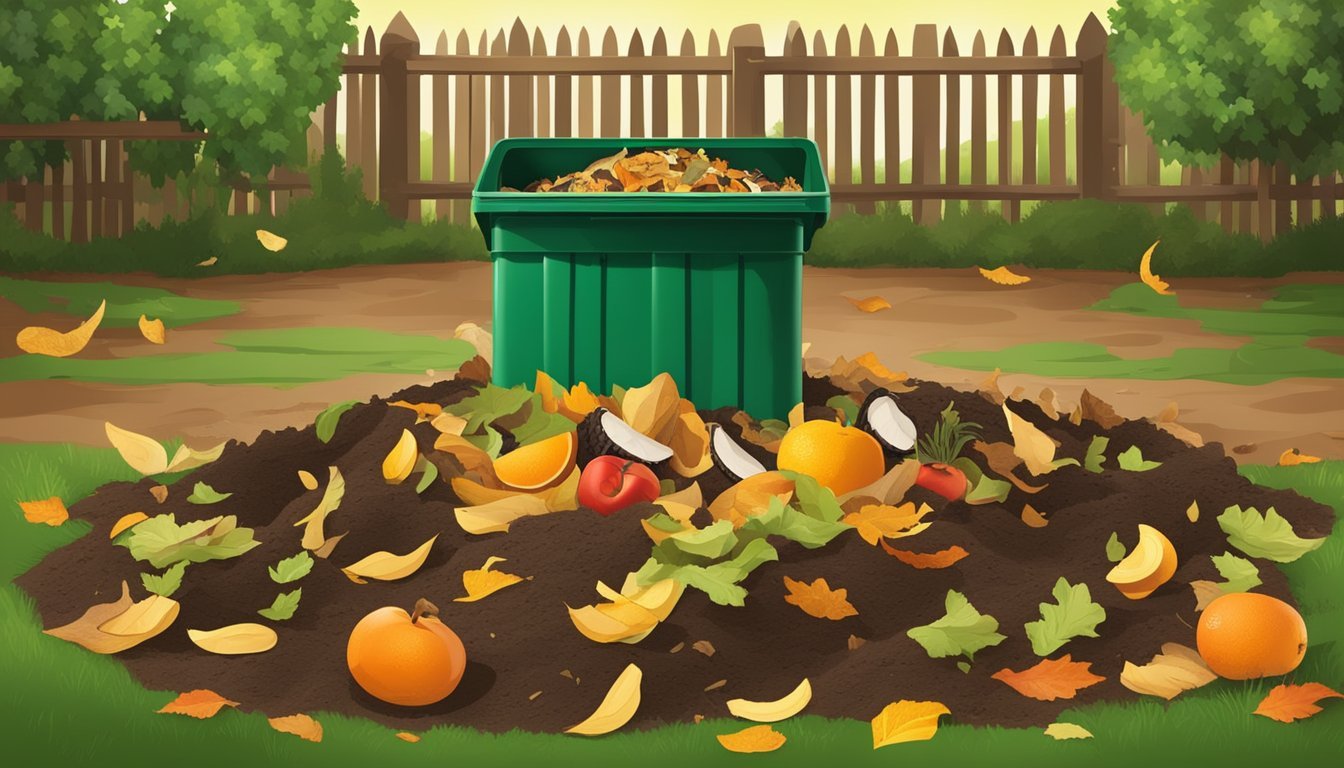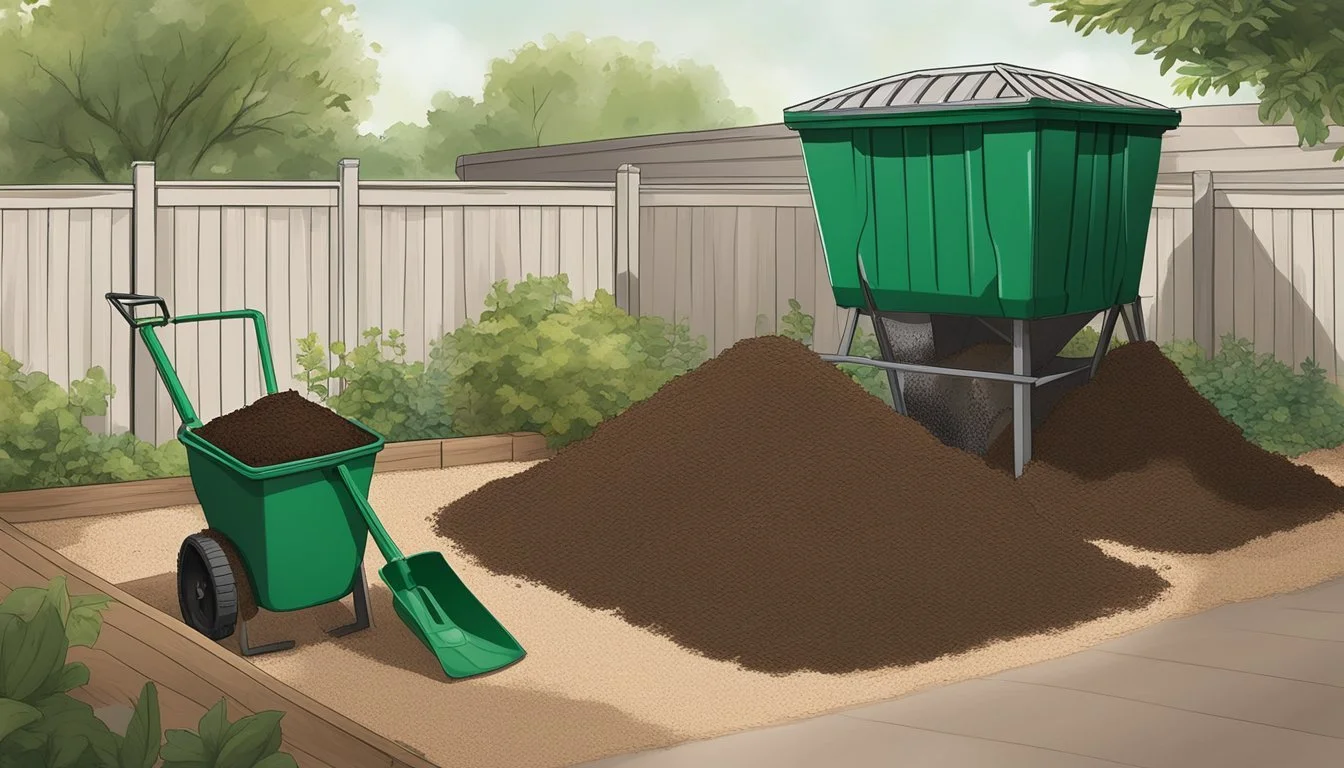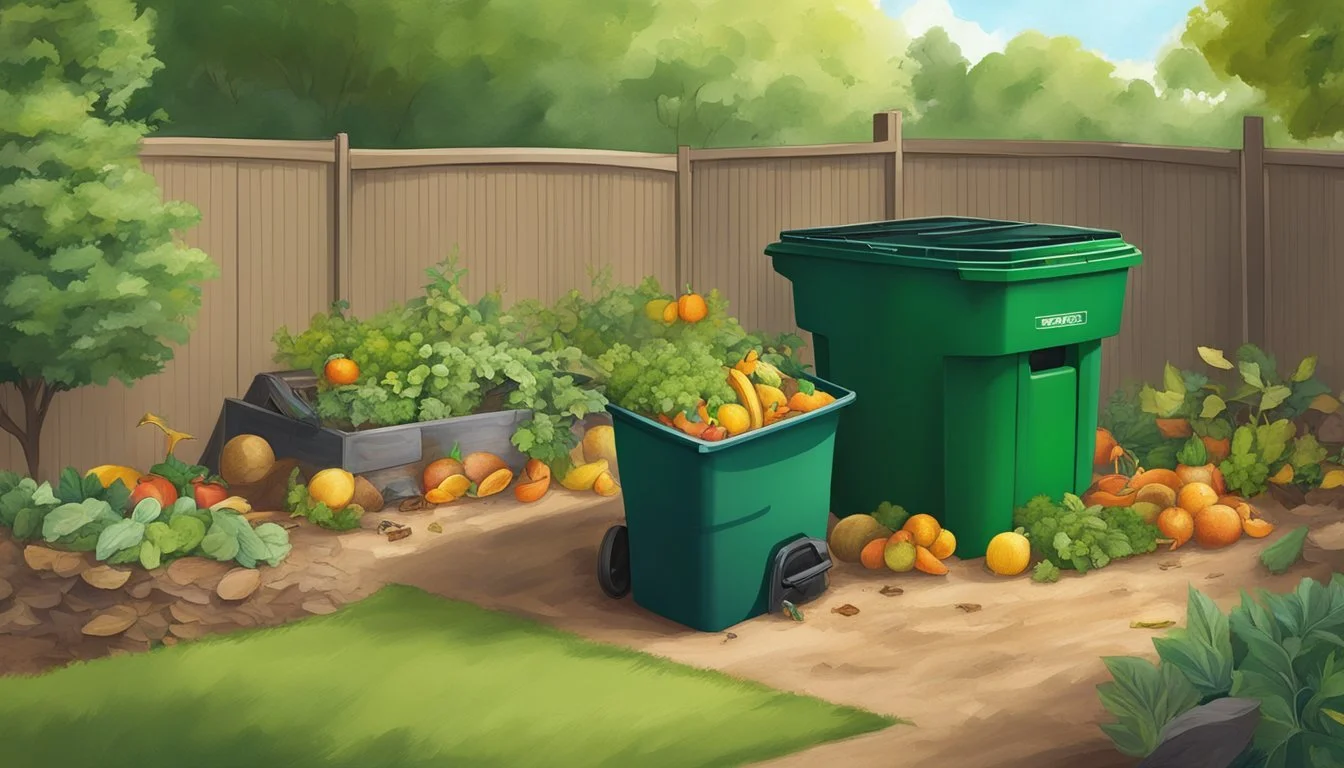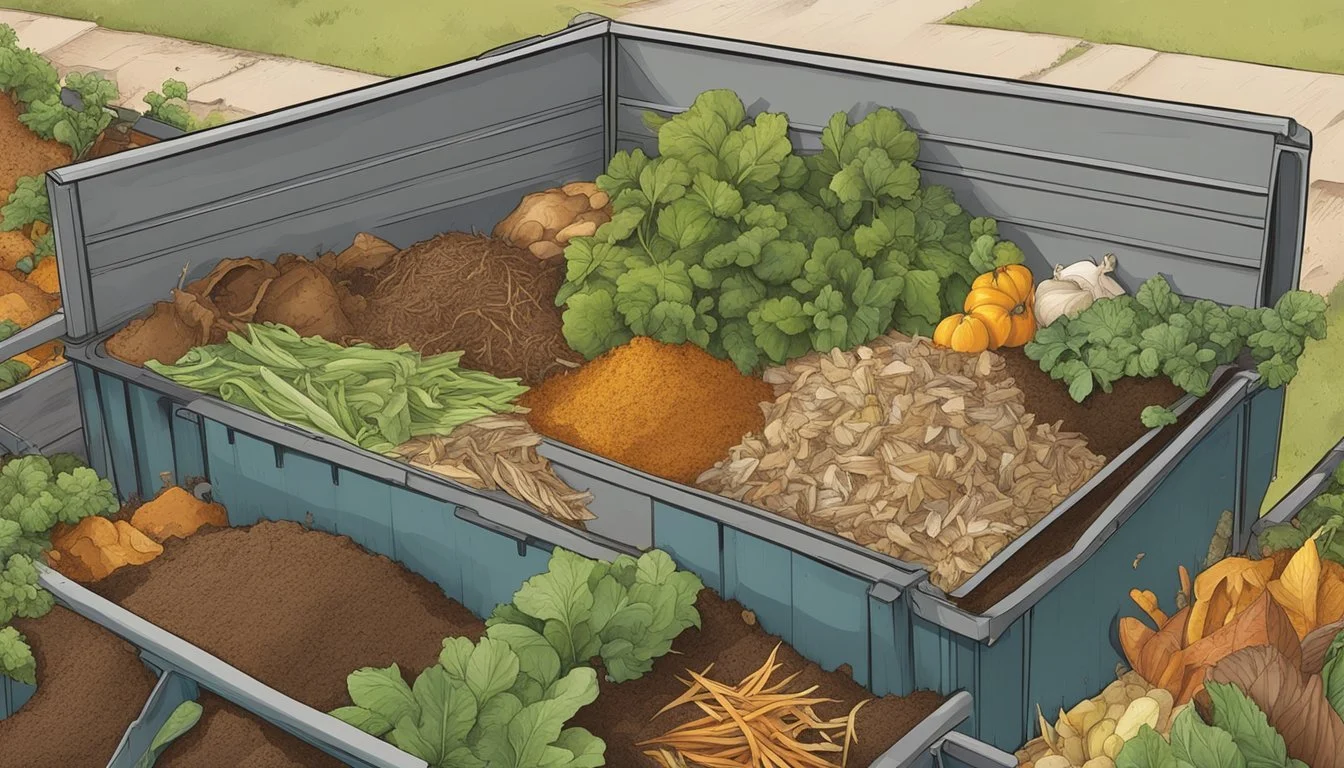Guide to Composting in Abilene, TX
Steps for Sustainable Waste Management
Composting is a practical and environmentally friendly method of repurposing organic waste into nutrient-rich soil amendments, and it's gaining popularity in Abilene, TX. Abilenians are turning their kitchen scraps and yard debris into garden gold, benefitting both their gardens and the environment. The process of composting encourages the natural decomposition of organic material, fostering a thriving ecosystem right in one's backyard. By engaging with the local community through classes and resources for effective composting practices, residents of Abilene are learning to reduce household waste and enhance the quality of their soil.
In Abilene, the approach to composting comes with its unique regional considerations. The semiarid climate requires a tailored strategy to manage the balance of green and brown compost materials, ensuring a successful decomposition process. Resources such as the Abilene Public Library offer educational opportunities for locals to understand and master composting techniques suited to the area. With the help of expert guidance, residents can learn to create compost bins that are cost-effective and conducive to their specific environmental conditions.
Local initiatives and educational programs serve as a testament to the community's commitment to sustainability. The Environmental Recycling Center in Abilene, for example, provides locals with a place to manage larger quantities of organic waste. These facilities, alongside detailed guides on how to use compost effectively in their gardens and landscapes, empower individuals to contribute positively to the overall health of the local environment. Composting in Abilene is more than just a hobby; it's a collective movement towards a greener, more sustainable city.
Benefits of Composting
Composting in Abilene, TX offers multiple benefits, ranging from enhancing soil quality to helping the environment by reducing waste. This section will explore the specific advantages.
Environmental Advantages
Composting significantly benefits the environment by repurposing organic material and returning it to the earth. It helps reduce the emission of greenhouse gases, specifically methane, by diverting organic matter away from landfills where it decomposes anaerobically. Additionally, composting can mitigate soil erosion, preserving the local landscape.
Improvement of Soil Quality
The addition of compost to the soil introduces a wealth of nutrients, creating a nutrient-rich environment for plants. This organic matter improves soil structure, which enhances root growth and water retention. Consequently, plants thrive with increased resilience against pests and diseases.
Reduction of Waste
By converting kitchen scraps and yard debris into compost, Abilene residents can significantly cut down the amount of waste they contribute to landfills. This not only extends the lifespan of landfills but also lessens the city's carbon footprint. The transformation of waste into a valuable resource represents a proactive step towards sustainable waste management.
Understanding the Basics of Composting
Composting transforms organic materials into a rich soil amendment through a process that requires the right balance of carbon, nitrogen, air, and moisture. Let's explore the foundational knowledge needed to understand composting.
What Is Composting?
Composting is the natural process of recycling organic matter, such as leaves and food scraps, into a valuable organic fertilizer known as compost. It's an effective method for reducing waste and improving the soil's health.
The Science Behind It
The composting process is driven by microorganisms that feed on organic materials. These organisms require a balanced environment with adequate oxygen and moisture to thrive. As they decompose organic matter, they produce heat, which helps to further break down the materials and kill weed seeds and pathogens.
Green vs. Brown Materials
Composting requires a mix of 'green' materials, which are nitrogen-rich, and 'brown' materials, which are high in carbon.
Greens: Kitchen scraps, grass clippings, and coffee grounds
Browns: Dry leaves, twigs, and cardboard
An ideal compost pile alternates layers of greens and browns to create an environment conducive to decomposition. The goal is to maintain a carbon to nitrogen ratio of about 30:1 for optimal composting conditions.
Setting Up Your Composting Area
In Abilene, TX, creating an effective composting area involves two critical steps: selecting an ideal spot and opting for the right container. With Abilene's climate in mind, these decisions can greatly influence how well your composting efforts will turn out.
Finding the Right Location
When choosing a location, Abilene residents should consider where it will optimally balance sun exposure with some shade to maintain consistent moisture and temperature. An area of the yard or garden that is dry, flat, and well-drained serves as an excellent choice for your composting system. Proximity to your outdoor space is also convenient for adding kitchen scraps and yard waste, while a spot away from neighbors may be considerate to manage any potential odors.
Choosing a Composting Container
Composting containers come in various forms, with compost bins and tumblers as popular options. For those with limited space, such as a patio or balcony, smaller containers or even a specialized tumbler system can be utilized. The container should be chosen based on how much organic waste is typically produced; larger households or those with extensive gardens might opt for a bigger bin. Eartheasy gives practical advice on containment options for your compost pile, ranging from simple wire circles to more sophisticated closed bins that can deter pests and conserve moisture.
What to Compost
Composting is a valuable technique for recycling organic matter into a rich soil amendment beneficial for gardens and landscaping. In Abilene, TX, understanding what to compost is crucial for a successful and odor-free composting experience.
Ideal Materials for Composting
Kitchen scraps: Most waste from the kitchen is perfect for composting. This includes:
Vegetable scraps
Fruit peels
Coffee grounds
Eggshells
Yard waste: Collecting and using organic material from your garden or lawn provides a good carbon to nitrogen ratio:
Grass clippings
Leaves
Yard trimmings
Straw
Wood chips
Additional compostable items: These materials are excellent for creating the necessary bulk and structure within your compost pile:
Cardboard (non-waxed)
One should mix greens and browns – materials rich in nitrogen and those rich in carbon – to ensure quick decomposition.
Items to Avoid in Compost
Certain materials can attract pests or cause the compost to have a bad odor and should be excluded:
Meat: Could attract rodents and cause a foul smell.
Dairy products: Similar to meat, can attract unwanted pests and odors.
Bones: Do not break down easily.
Grease and oils: Slow to decompose and can attract pests.
Paint: Contains hazardous chemicals.
Animal products: Like meat and dairy, can cause odor and attract pests.
Weed seeds: May not be fully destroyed and could propagate once used in the garden.
Maintaining a proper balance without these negative contributors will help ensure that composting efforts in Abilene are both efficient and environmentally friendly.
The Composting Process
The process of composting in Abilene, TX transforms organic waste into a nutrient-rich soil amendment through controlled decomposition. The right mix of carbon and nitrogen, along with water, oxygen, and suitable temperatures, facilitates this transformation.
Layering Your Compost
Building the compost pile begins with layering. One should alternate layers of 'green' materials high in nitrogen, such as fruit and vegetable scraps or coffee grounds, with 'brown' materials rich in carbon, like dry leaves or shredded paper. This mix is crucial because carbon acts as an energy source for the microorganisms that break down the waste, while nitrogen is a protein source for them to grow and reproduce.
Green Materials (Nitrogen-rich): Food scraps, lawn clippings
Brown Materials (Carbon-rich): Dry leaves, branches, sawdust
Maintaining the Right Conditions
To ensure effective decomposition, maintaining the right conditions in the compost pile is essential. Moisture should be monitored to keep the pile as damp as a wrung-out sponge, and oxygen must be supplied to the microorganisms through regular turning of the pile. Maintaining a temperature between 135°F and 160°F accelerates the composting process without killing beneficial organisms.
Moisture: Check regularly and add water if pile is dry.
Oxygen: Turn the pile every week to introduce air.
Temperature: Use a compost thermometer to monitor.
By carefully managing these elements, residents can turn their yard waste and kitchen scraps into valuable compost for gardening and landscaping in Abilene's unique climate.
Troubleshooting Common Issues
When maintaining a compost pile in Abilene, TX, residents might encounter common issues such as unpleasant odors and unwanted pests. It's important to address these efficiently to ensure a successful composting process.
Dealing with Odors
Compost should not emit a foul odor if it is balanced correctly. Unpleasant smells usually arise when there's an imbalance in the carbon-to-nitrogen (C/N) ratio or when the pile is too wet and soggy, leading to anaerobic conditions. One can manage odors by maintaining a C/N ratio of 25-30:1, which is optimal for a healthy compost system. If the pile is soggy, adding more brown materials, like dry leaves or straw, helps to soak up excess moisture and restore balance.
Aim for Balance: Ensure your compost has the right mix of green and brown materials.
Aerate Regularly: Turn the pile to improve airflow and reduce anaerobic conditions that cause foul smells.
Preventing Pests
Rodents and insects are often attracted to compost piles, but they can be kept at bay by proper management techniques. To deter pests, one should avoid adding meat, dairy, or oily foods to the compost and ensure that the pile is covered with a layer of soil or finished compost. Regularly turning the compost pile disrupts any beginnings of rodents' nests and helps keep larger pests away.
Compost Composition: Exclude meat, dairy, and oily substances which are attractants for rodents.
Secure the Pile: Use a bin with a lid or cover your pile with a tarp to prevent pests from accessing it.
By following these specific strategies, composting in Abilene can be a breeze, and the common issues of odors and pests can be efficiently managed.
Using Your Compost
Recognizing the right time to use compost and understanding how to apply it effectively can significantly enhance the health and productivity of gardens and lawns.
When Is Compost Ready?
Finished compost typically resembles dark, crumbly topsoil and has a pleasant, earthy odor. One can ascertain it's ready when the original organic materials are no longer recognizable, and it has cooled to ambient temperature. This process may take anywhere from a few months to a year.
How to Use Finished Compost
To utilize finished compost as a fertilizer:
Mix it into the top few inches of your garden soil to enrich plant beds.
Use a half-inch layer to side-dress established plants, gently mixing it into the soil.
For using compost as mulch:
Spread a two to three-inch layer on top of the soil around plants to retain moisture and control weeds.
When applying compost to lawns:
Distribute a thin layer over the grass to improve soil quality and provide nutrients.
In all cases, one should ensure that the finished compost is evenly applied and well incorporated to make the most out of its nutrient content for plants and gardens.
Composting in the Community
Composting in Abilene, TX, encompasses a variety of initiatives that encourage the transformation of organic waste into nutrient-rich soil amendments. These efforts are aimed at nurturing community gardens, reducing landfill waste, and promoting sustainable waste management practices.
Community & Shared Composting Initiatives
Community composting initiatives in Abilene are designed to engage residents in the process of recycling food waste. Many local programs involve community gardens where individuals can contribute their kitchen scraps and learn about the composting process. These sites often offer both drop off services for organic waste and opportunities for community members to pick up compost for their own use, thereby supporting a cycle of sustainability.
Garden Partnerships: Collaborations between composting sites and community gardens help in diverting food waste from landfills. Local residents are encouraged to deposit their organic waste at designated composting bins situated in or near community gardens.
Educational Outreach: Programs such as those mentioned in an Abilene Public Library event aim to educate citizens on how to turn their garbage into "garden gold," highlighting the benefits of composting.
Local Composting Resources
Abilene provides residents with resources to facilitate composting at a community level. These include:
Guides and How-Tos: Resources such as the "Growing Local Fertility" guide offer comprehensive information on starting and maintaining community composting operations.
Regulatory Information: For those looking to understand the legal aspects of composting, the Texas Commission on Environmental Quality provides a list of guidelines regarding composting and mulching, and validates if an operation is regulated, as seen on their Composting page.
Best Practices: In-depth resources like "Community Composting Done Right" discuss best management practices for composting efficiently and effectively within the community.
Local initiatives and educational efforts in Abilene demonstrate the city's commitment to sustainability through the promotion of composting practices. By fostering a sense of responsibility and providing the necessary resources, Abilene helps residents contribute to sustainable waste management and the cultivation of productive community gardens.
Advanced Composting Techniques
In the pursuit of enriching soil and reducing waste, certain advanced composting methods stand out for their efficiency and environmental benefits. In Abilene, TX, gardeners and sustainability enthusiasts can adopt these strategies to optimize their composting process.
Vermicomposting
Vermicomposting harnesses the digestive power of earthworms to break down organic material into high-quality compost. This method is ideal for indoor or small-scale composting as it requires less space and can process food scraps effectively. To start vermicomposting, one needs a bin filled with bedding material, such as shredded newspaper or cardboard, and a population of red worms. The earthworms will consume kitchen scraps, leaving behind nutrient-rich castings that benefit plant growth.
Hot vs. Cold Composting
Hot and cold composting differ primarily in temperature and decomposition speed. Hot composting reaches temperatures between 135-160°F, which accelerates the breakdown of organic matter by thermophilic microorganisms. This process requires a balance of "green" nitrogen-rich and "brown" carbon-rich materials, regular turning for aeration, and moisture control. Hot composting typically produces usable compost faster than cold composting and can reduce harmful greenhouse gases by ensuring efficient decomposition.
In contrast, cold composting is a more passive technique. It involves piling up garden and kitchen wastes and leaving them to decompose over time. While this method requires less maintenance, it takes longer to produce compost and can attract pests if not managed properly. Cold composting can still be effective in Abilene's temperature conditions, especially during the warmer months.
Legislation and Regulations
In Abilene, TX, the management of composting and mulching facilities is subject to specific state regulations. These facilities must adhere to general requirements, including air quality standards, as outlined in the Texas Administrative Code (TAC) Section 332.4 and 332.8. Compliance with both state and federal laws is mandated, particularly for facilities that divert materials from the municipal solid waste stream.
The Texas Commission on Environmental Quality (TCEQ) provides guidance on these regulations, as well as resources for those operating or looking to operate composting and mulching sites. To better understand the spectrum of regulations, individuals can refer to the TCEQ resources Composting and Mulching: Am I Regulated?
On a local level, Abilene's Code Compliance department plays a vital role in upholding health, safety, and quality of life ordinances. The city's code compliance ensures that landfills and waste management practices, including trash collection and disposal, comply with both municipal codes and broader environmental regulations to maintain a safe and healthy community environment for its residents.
For a comprehensive understanding of the municipal stipulations that govern waste management, including composting, referencing the Code of Ordinances provided by the City of Abilene is recommended. This resource details amendments and ordinances relevant to land development and waste management.
These regulations ensure that composting efforts in Abilene align with state and local environmental goals, contributing to sustainable waste management and environmental conservation.
FAQs & Tips for Success
What materials can I compost?
One can compost fruit and vegetable scraps, coffee grounds, eggshells, yard trimmings, and leaves. Avoid composting meat, dairy, and oily foods as they can attract pests and create odor.
How large should my compost pile be?
Ideally, the compost pile should be 3 feet by 3 feet, which allows it to reach the necessary temperatures for decomposition without becoming unmanageable. For more in-depth guidance, consider the Basics of Composting.
Can I compost in a small space? Absolutely, individuals with limited space can use a compost bin or tumbler to make the process more accessible.
How often should I turn the compost? Turning the compost every few weeks helps to aerate it and speed up the decomposition process.
Tips for Successful Composting
Balance: Aim for a good mix of 'browns' (carbon-rich materials) and 'greens' (nitrogen-rich materials).
Aeration: Regular turning is crucial to providing oxygen that helps break down the materials.
Moisture: The compost should feel moist like a wrung-out sponge; if it’s too dry, add water; if too wet, add more browns.
Size: Chop large pieces to speed up the decomposition process.
Use: Integrate about two inches of compost into the top six inches of soil for planting. As for maintenance, lightly sprinkle it on the lawn or garden How to Use Compost.
By adhering to these guidelines and frequently checking the balance of their compost pile, anyone can effectively turn waste into valuable soil amendment.
Conclusion
Composting is a beneficial practice for both gardeners and the environment in Abilene, Texas. With the right approach, homeowners can turn organic waste into nutrient-rich soil amendment, enhancing the growth of plants and reducing the reliance on chemical fertilizers. A successful composting setup involves maintaining optimal conditions for microorganisms to thrive, which includes:
Ensuring a balance of green and brown materials
Maintaining adequate moisture levels
Providing sufficient aeration through regular turning
Residents can choose from various methods like pile composting or using bins and tumblers, tailored to their space and effort preference. For those looking to achieve faster results and higher temperatures to kill most weed seeds, "hot" composting is an effective method.
Composting not only enriches the soil but reduces the strain on landfills, thereby supporting Abilene's environmental sustainability efforts. The community is encouraged to view composting as an ongoing process, a cycle that returns nutrients back into the earth, fostering a greener and healthier garden and environment.
Residents of Abilene are advised to adhere to local guidelines and use resources such as the AgriLife Today guide on composting, ensuring they are informed on best practices and legal requirements for composting within city limits.











